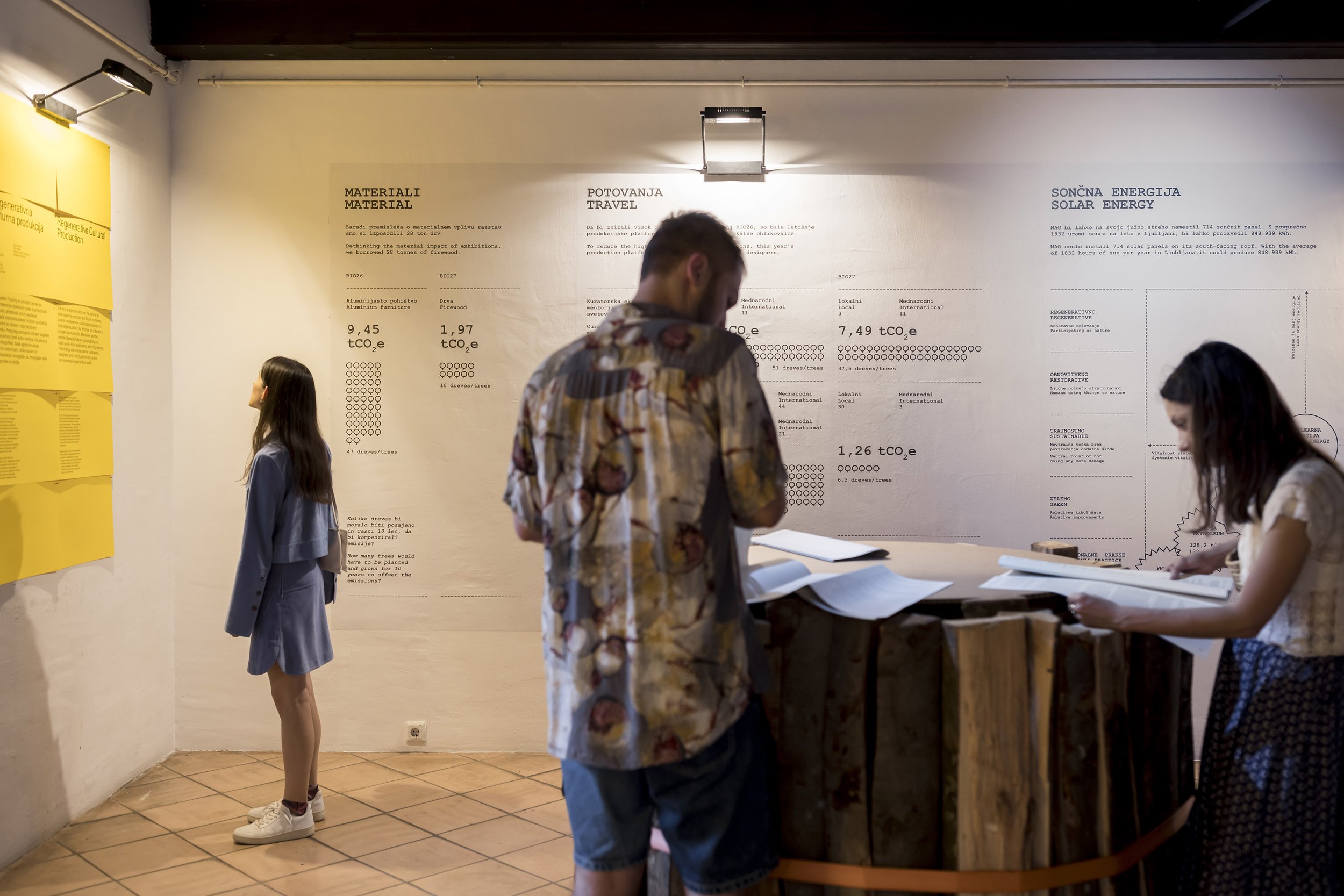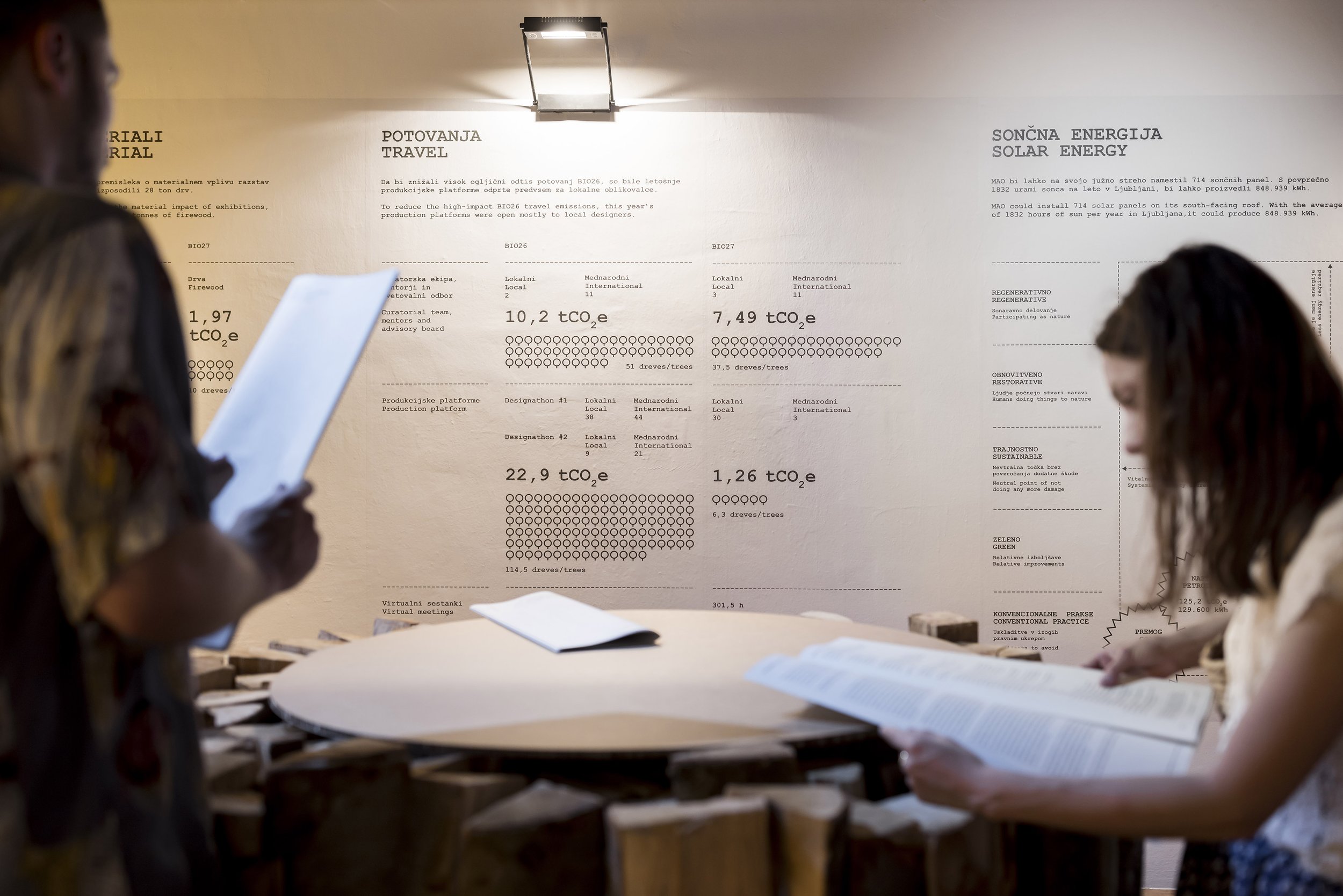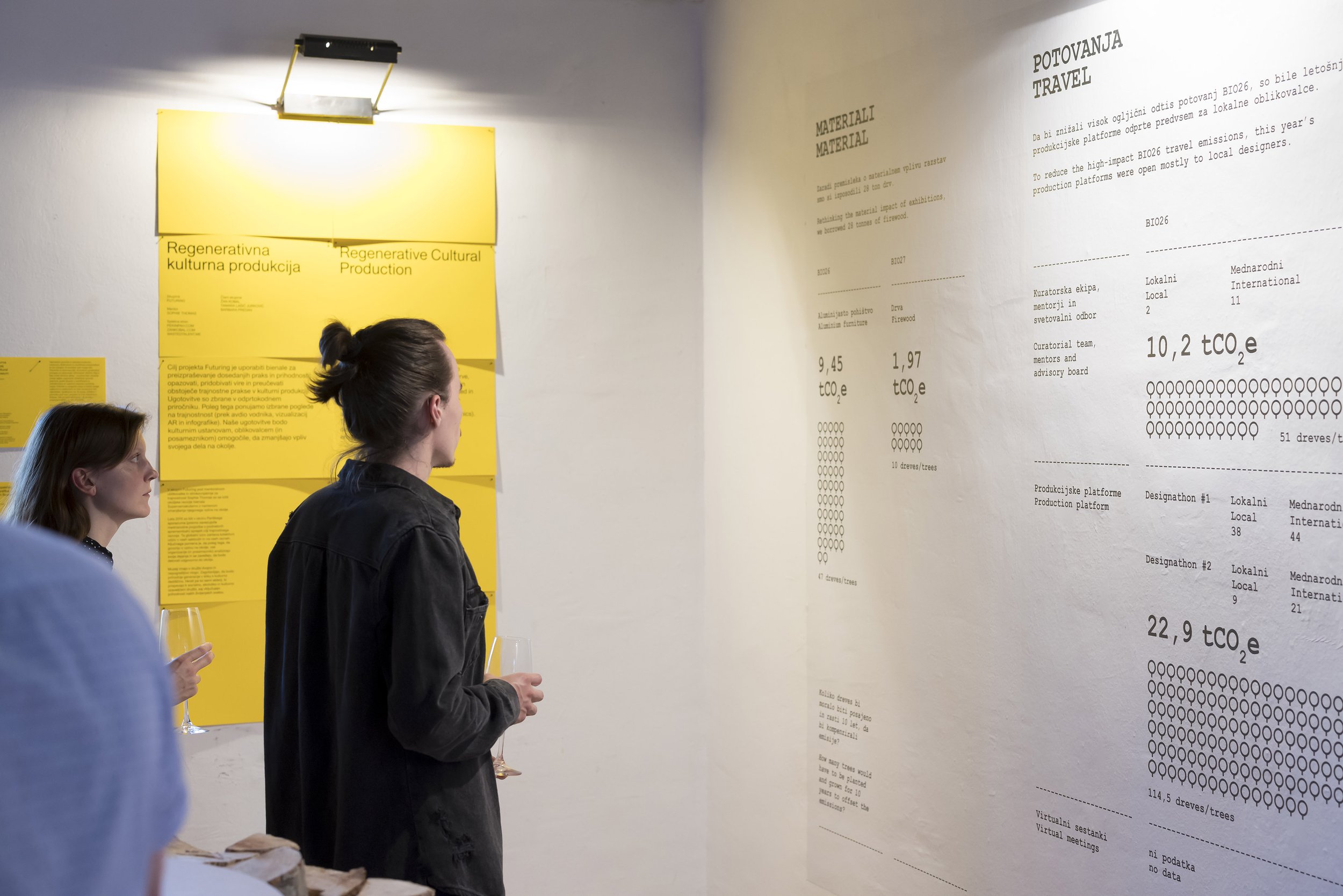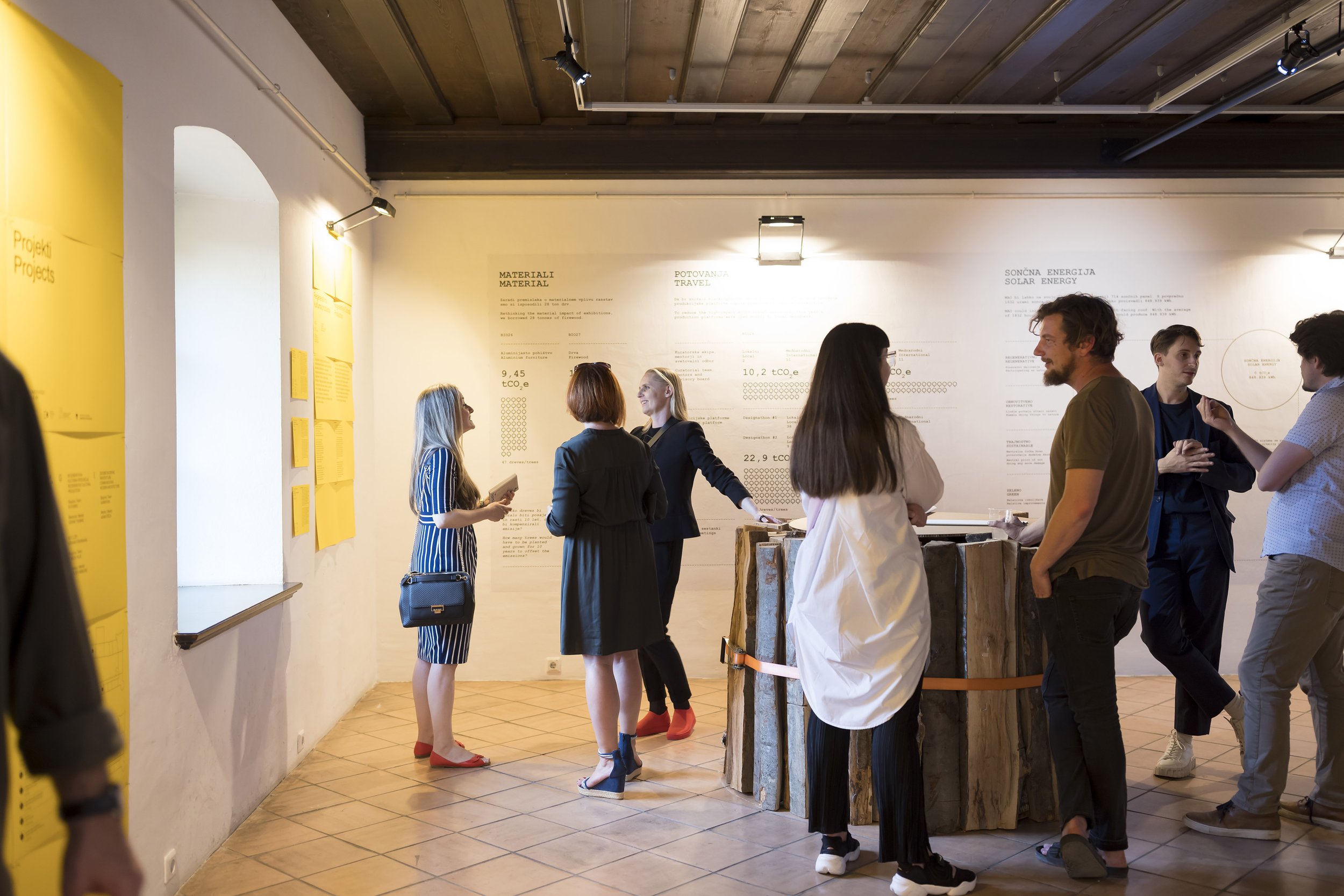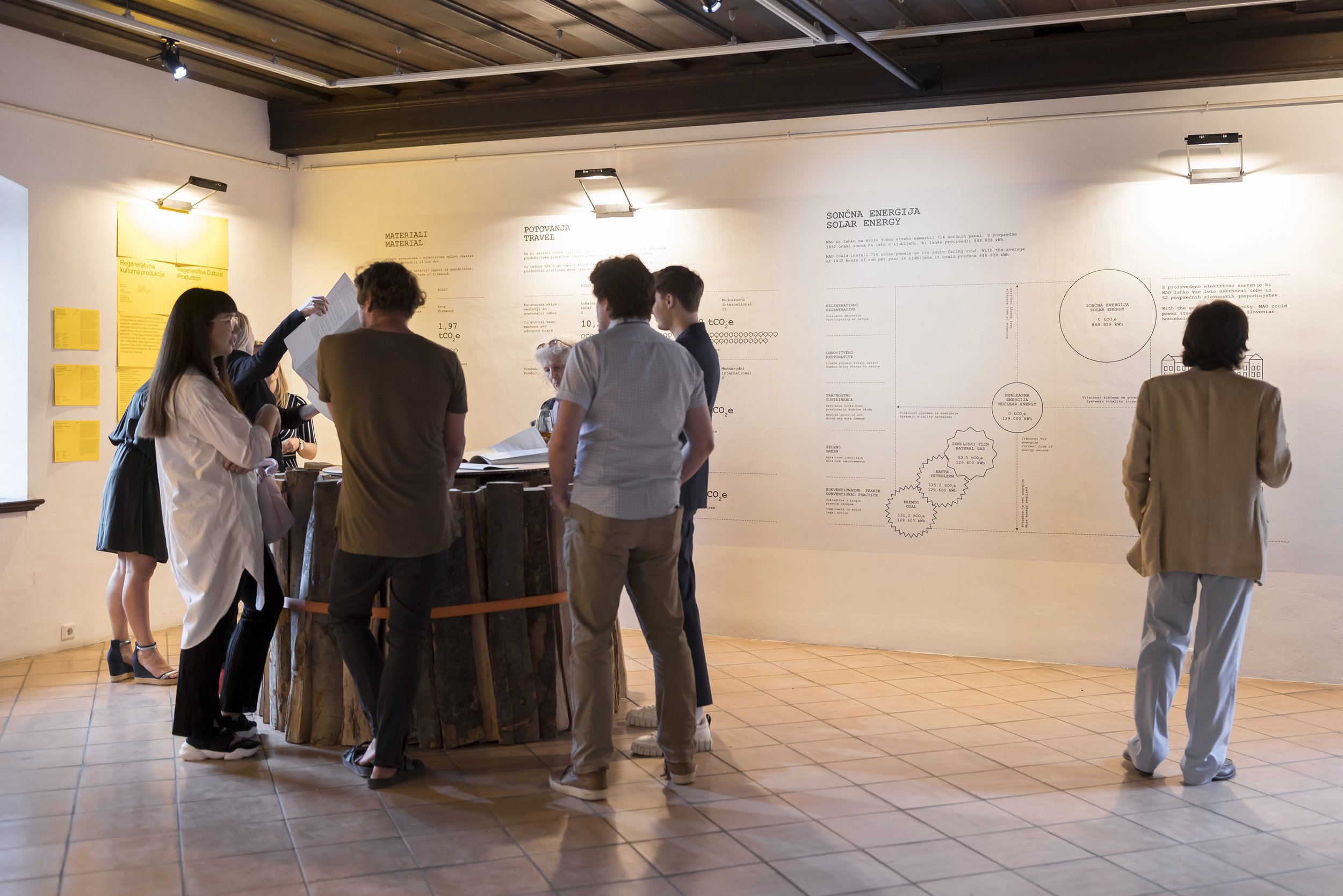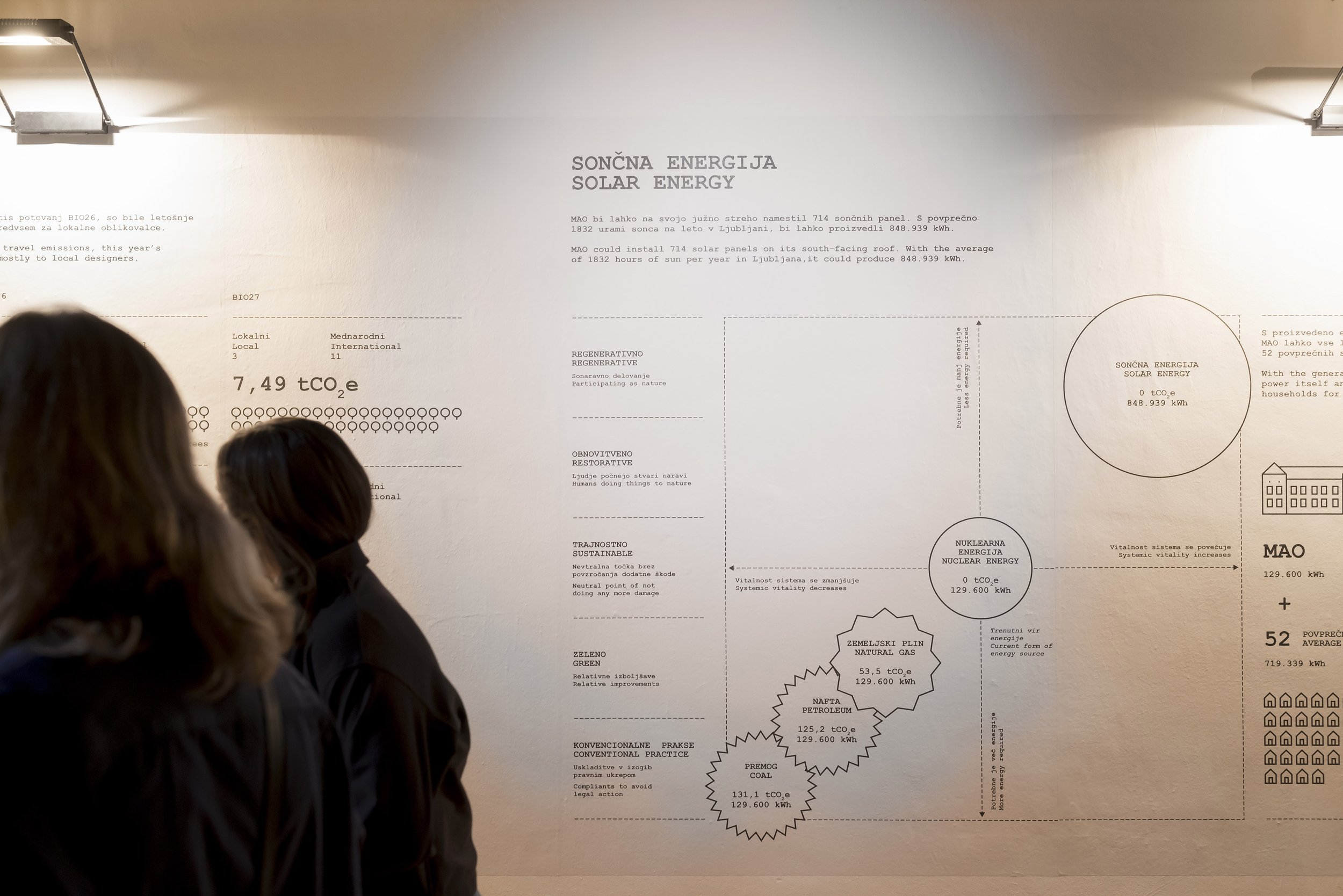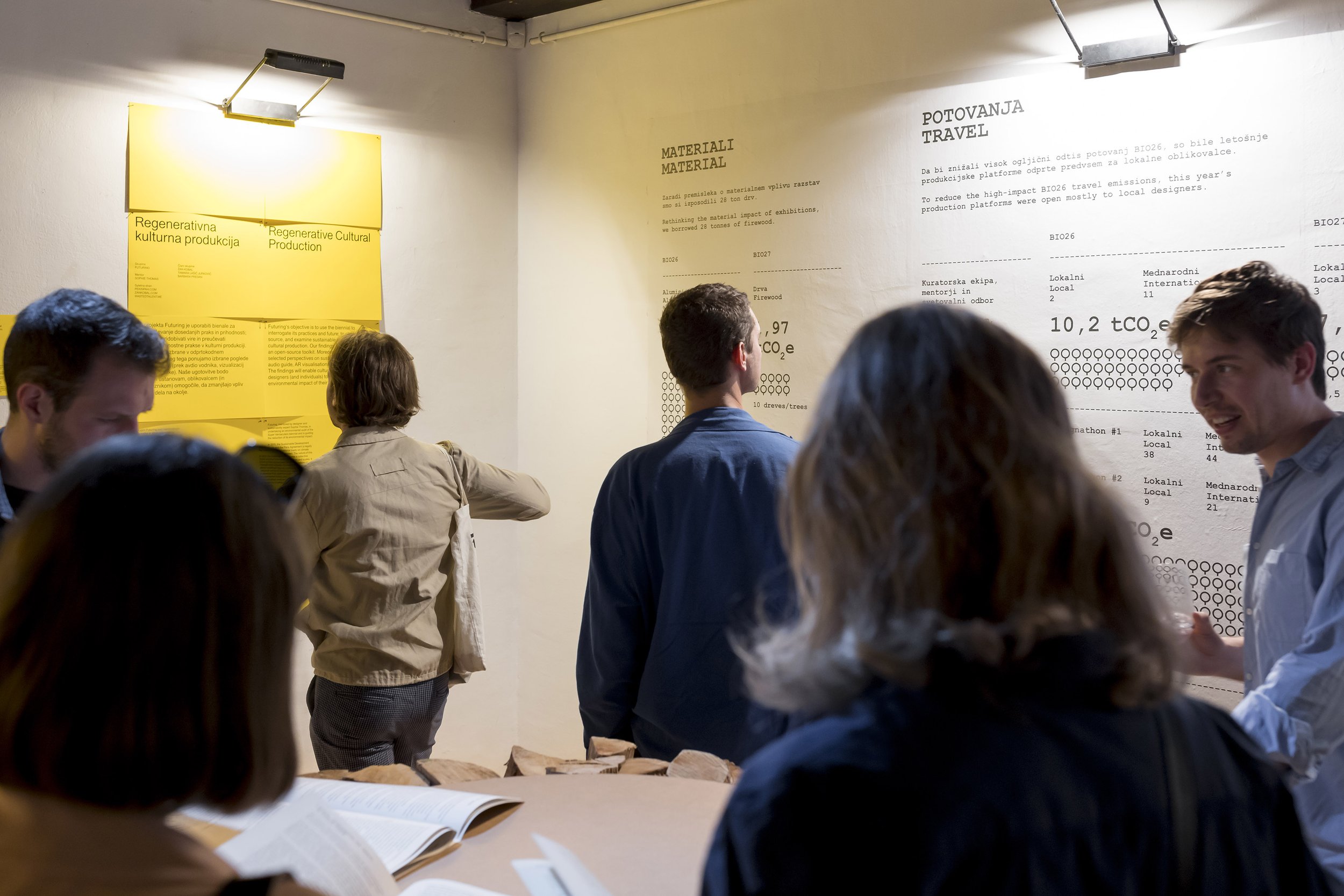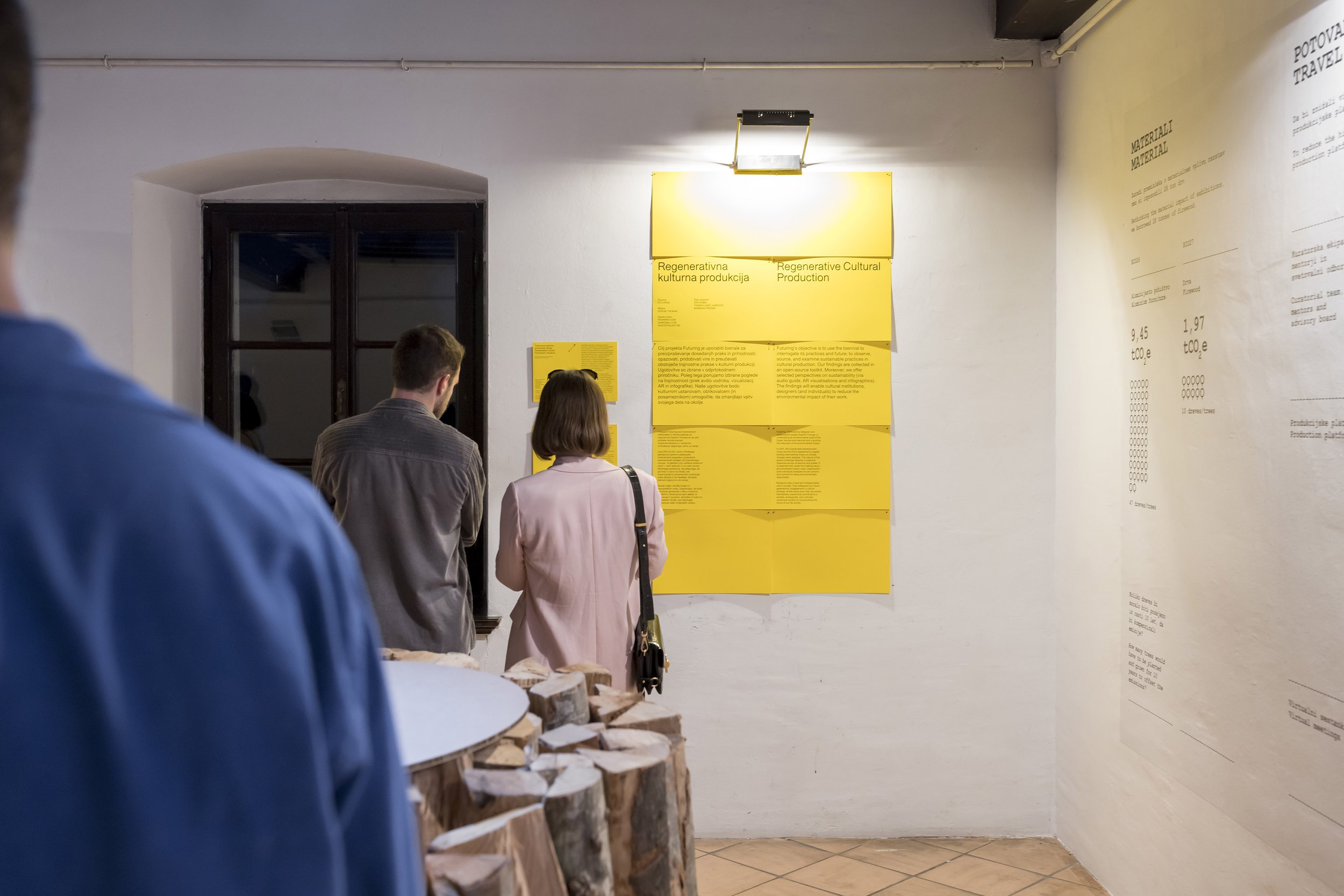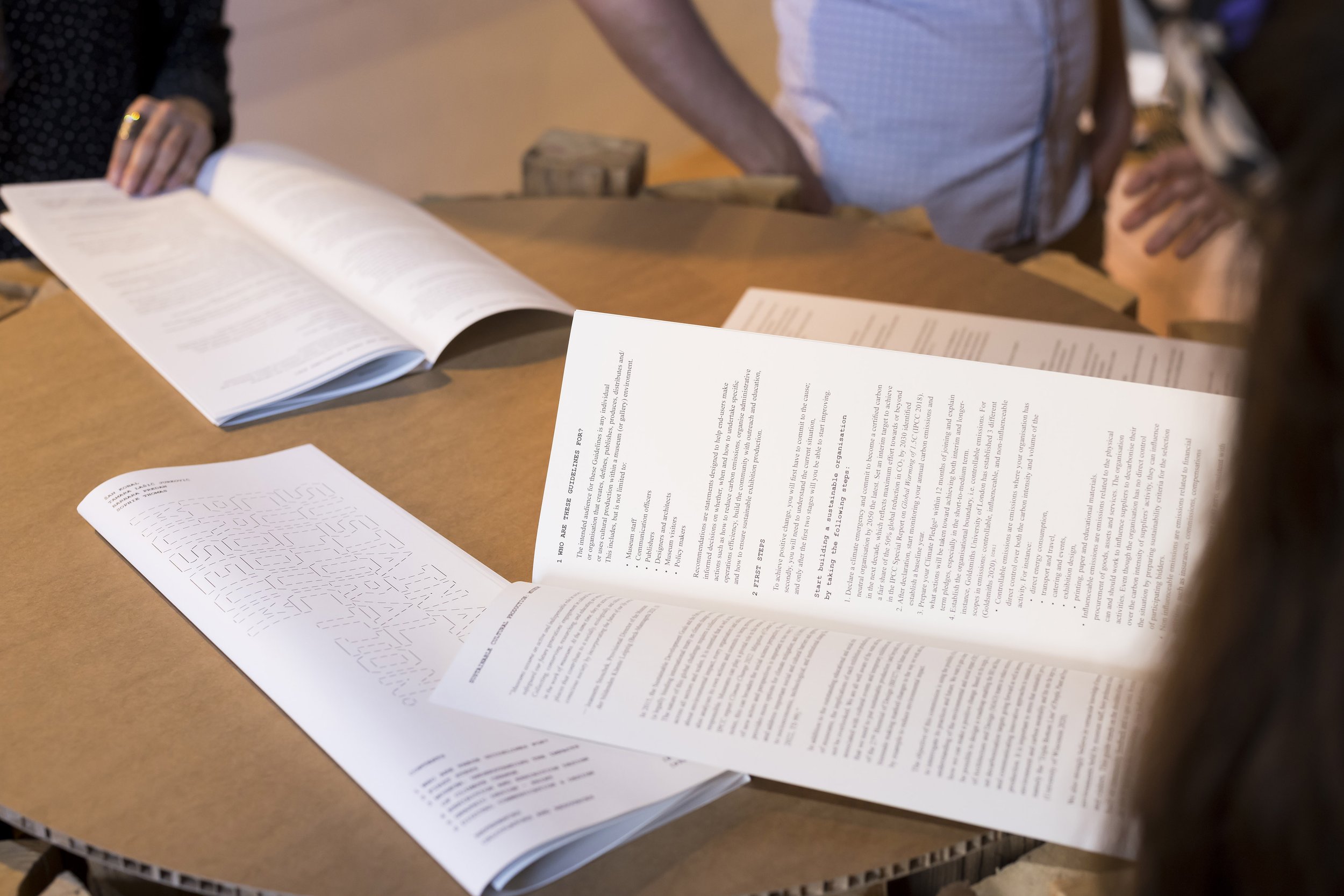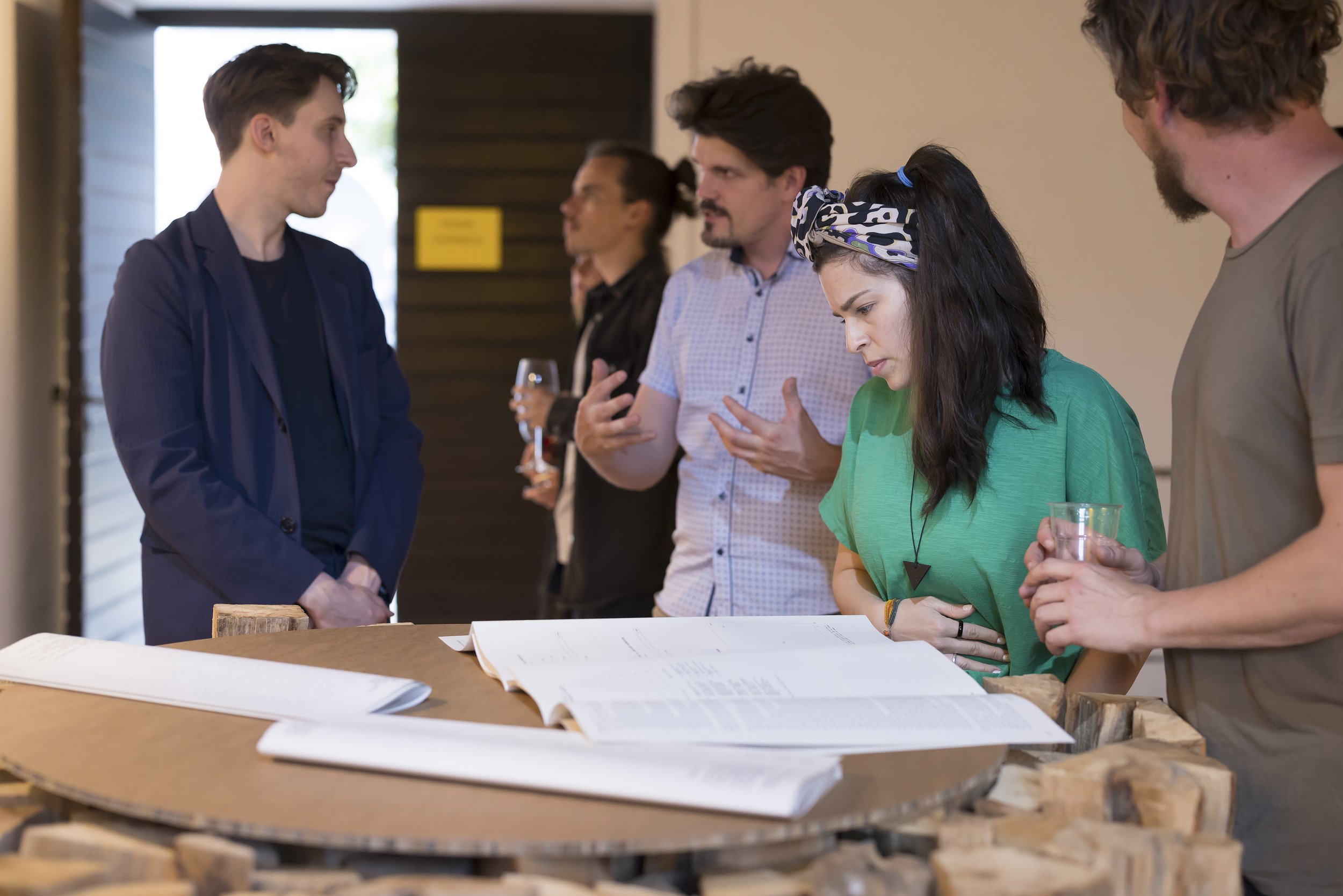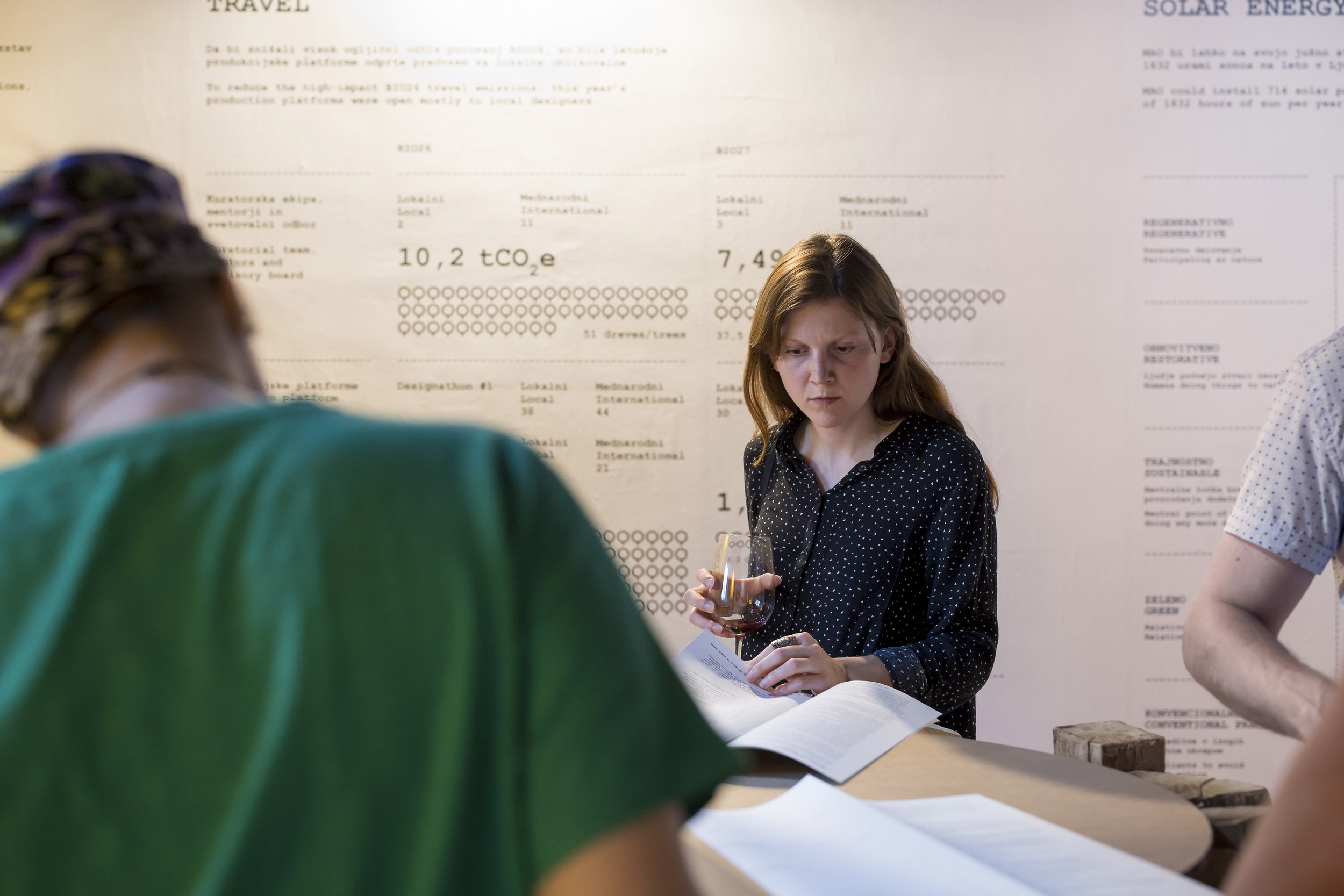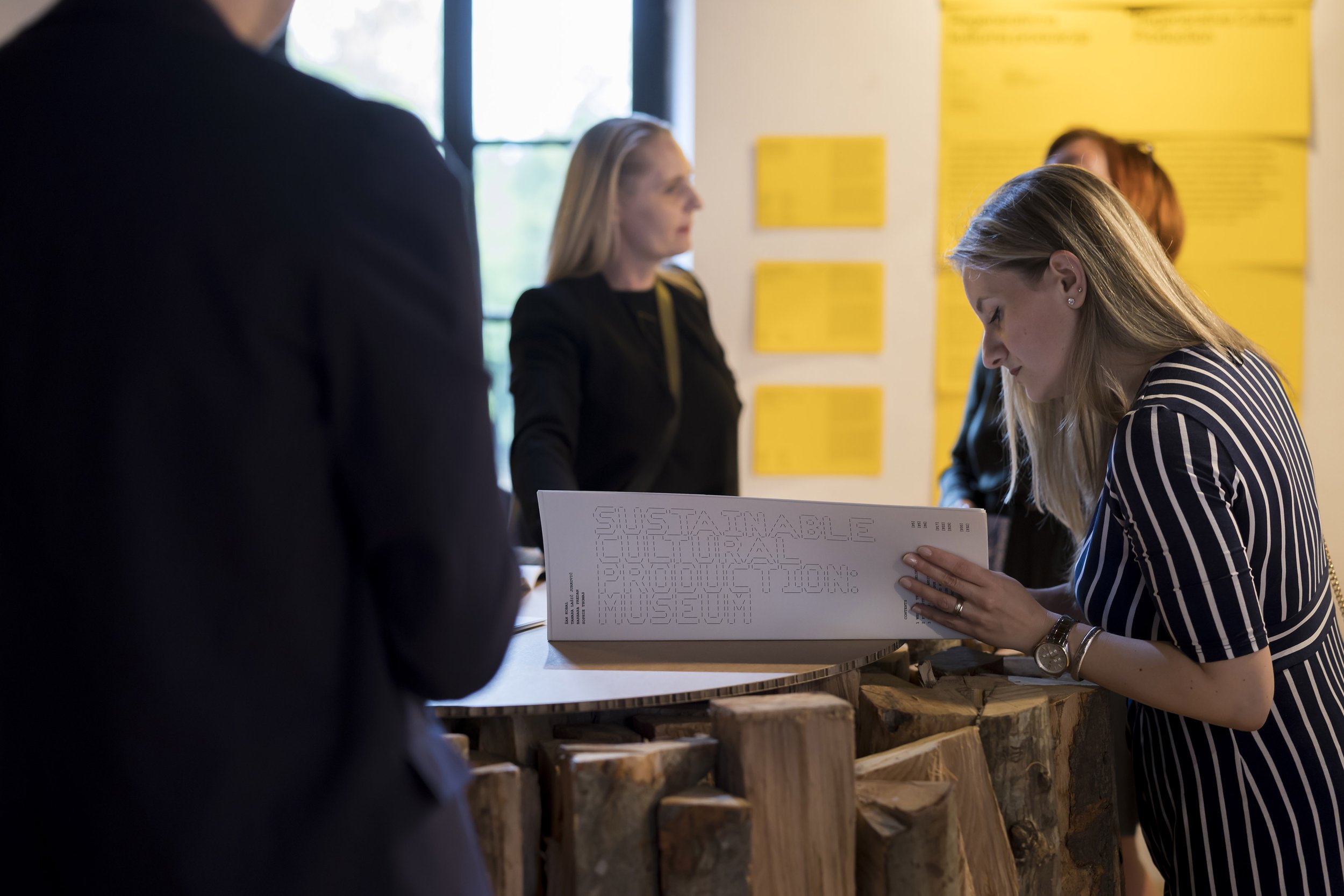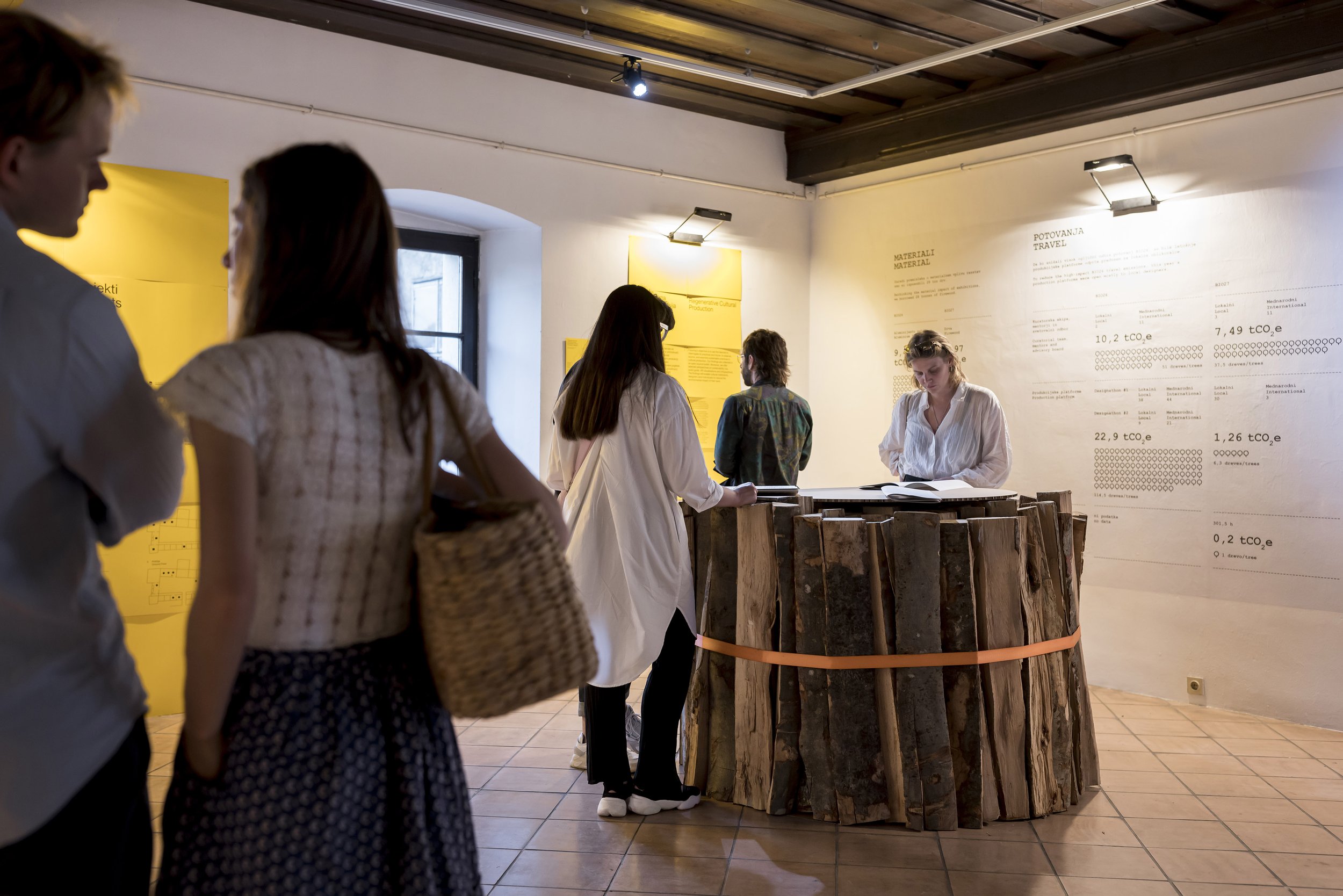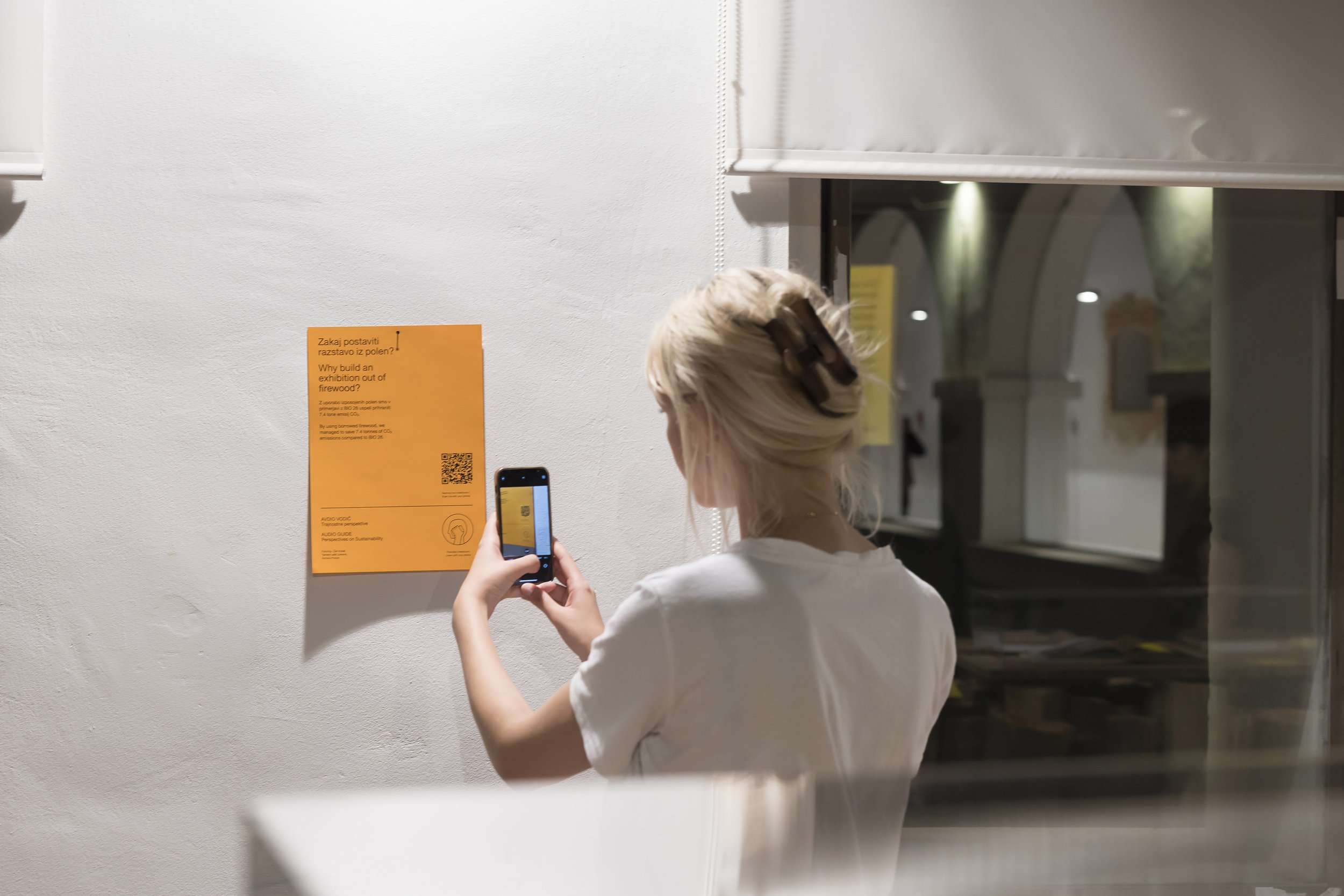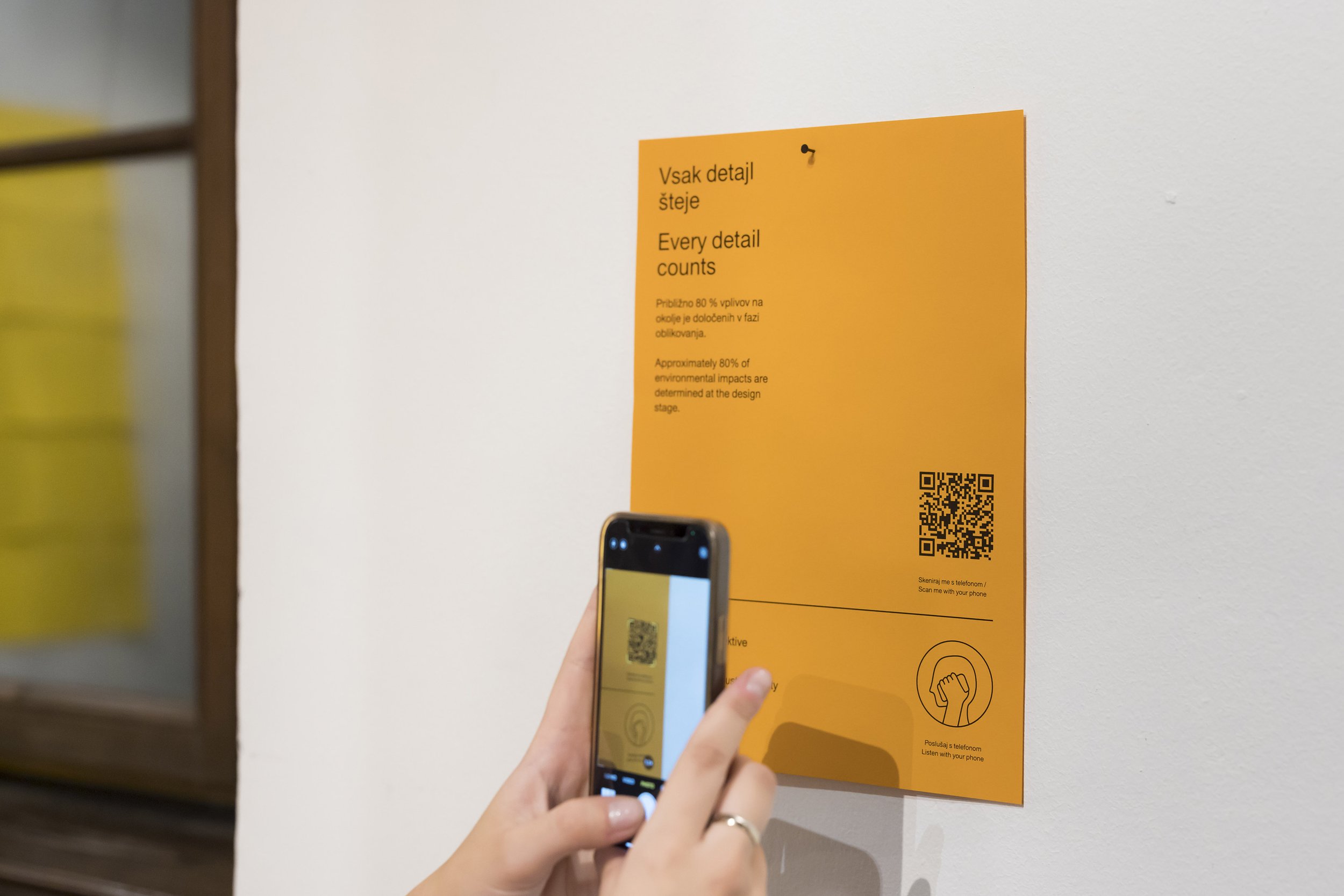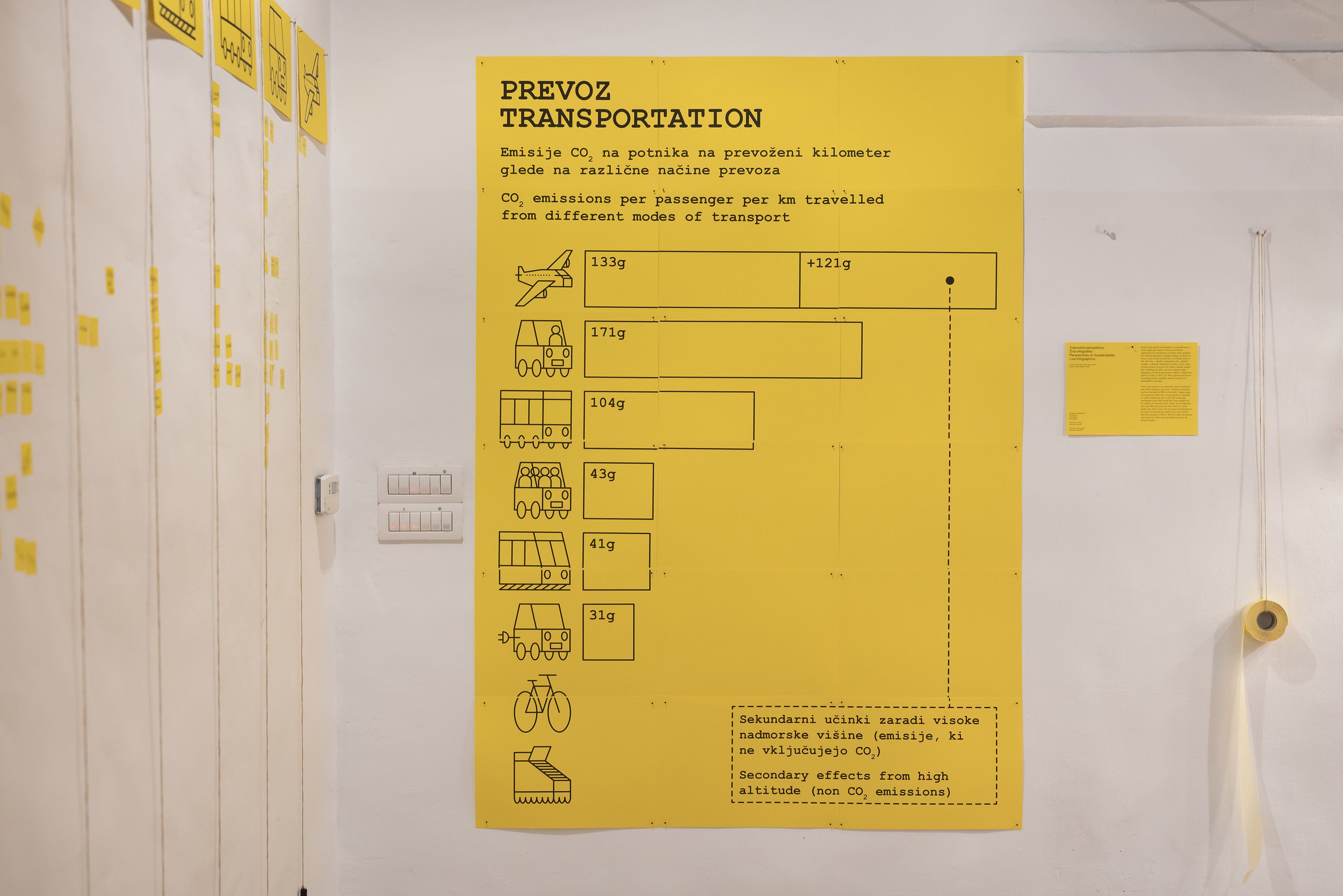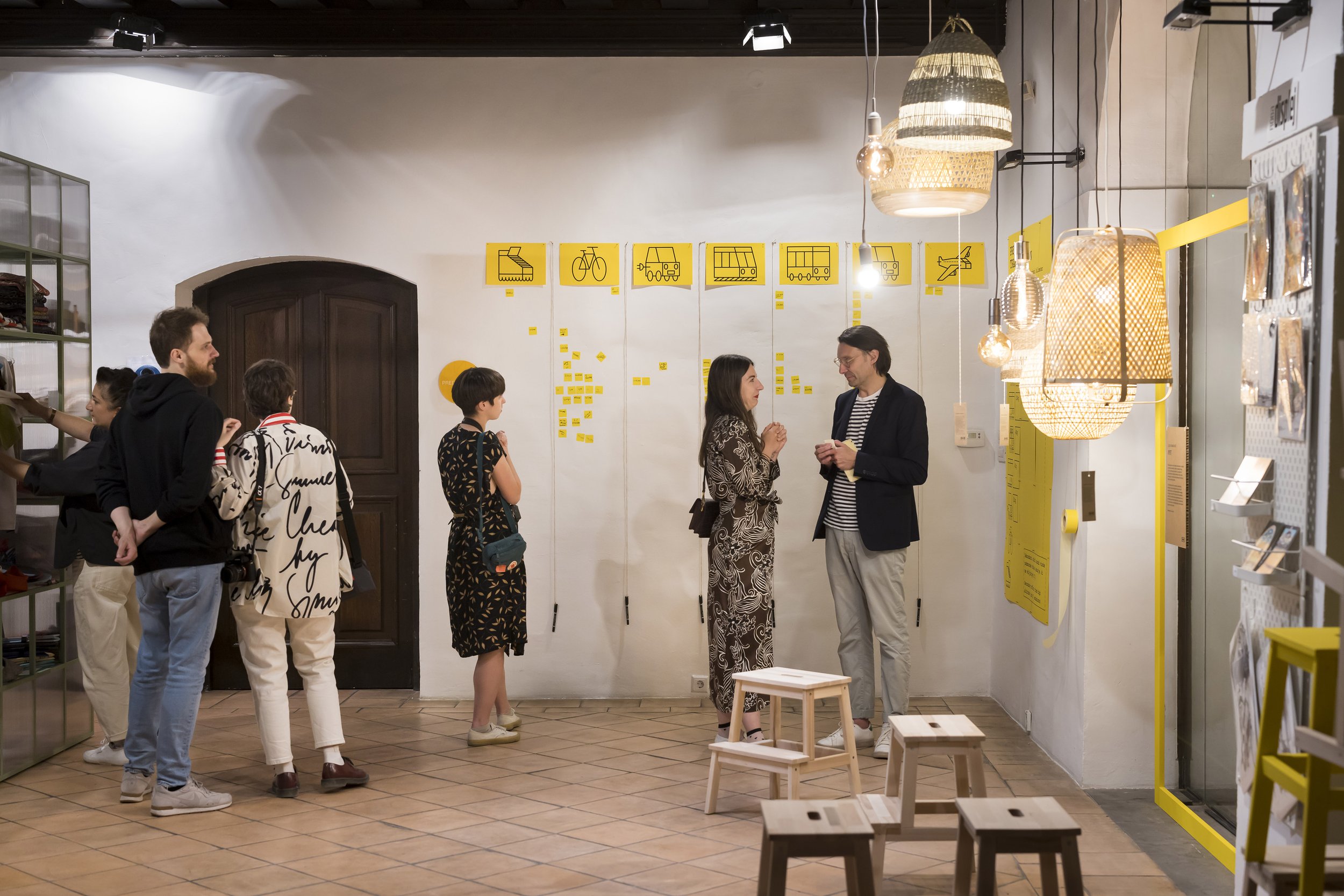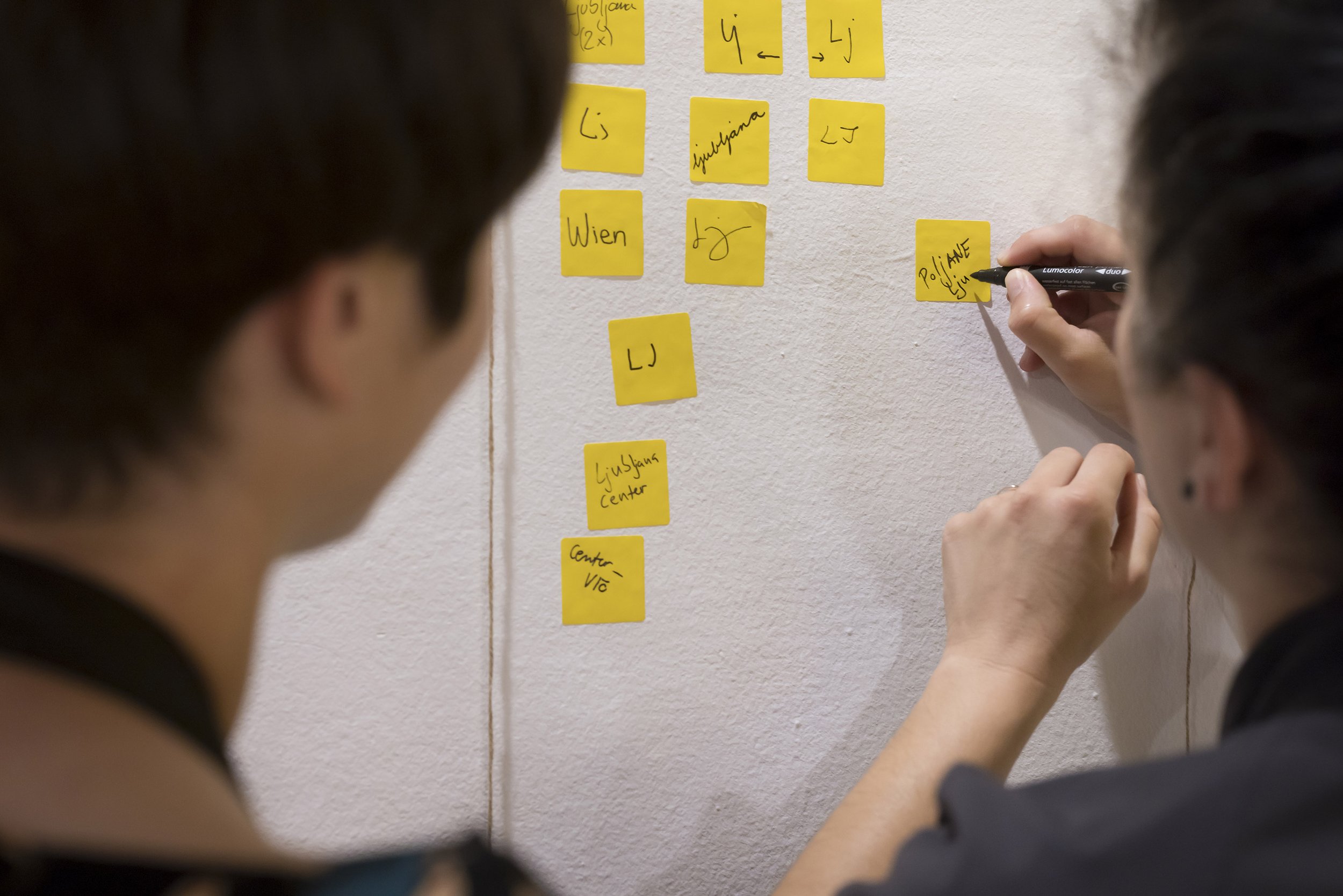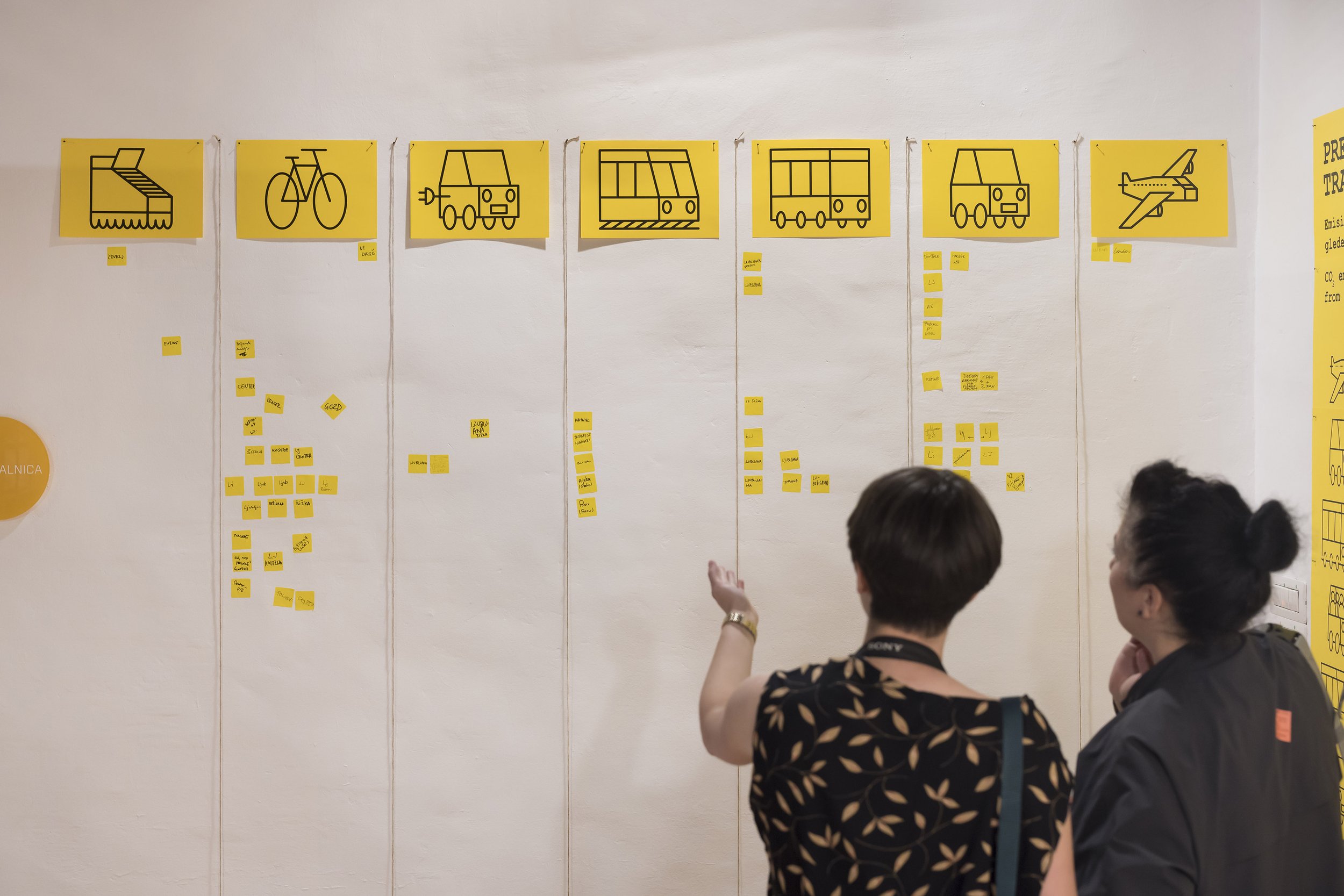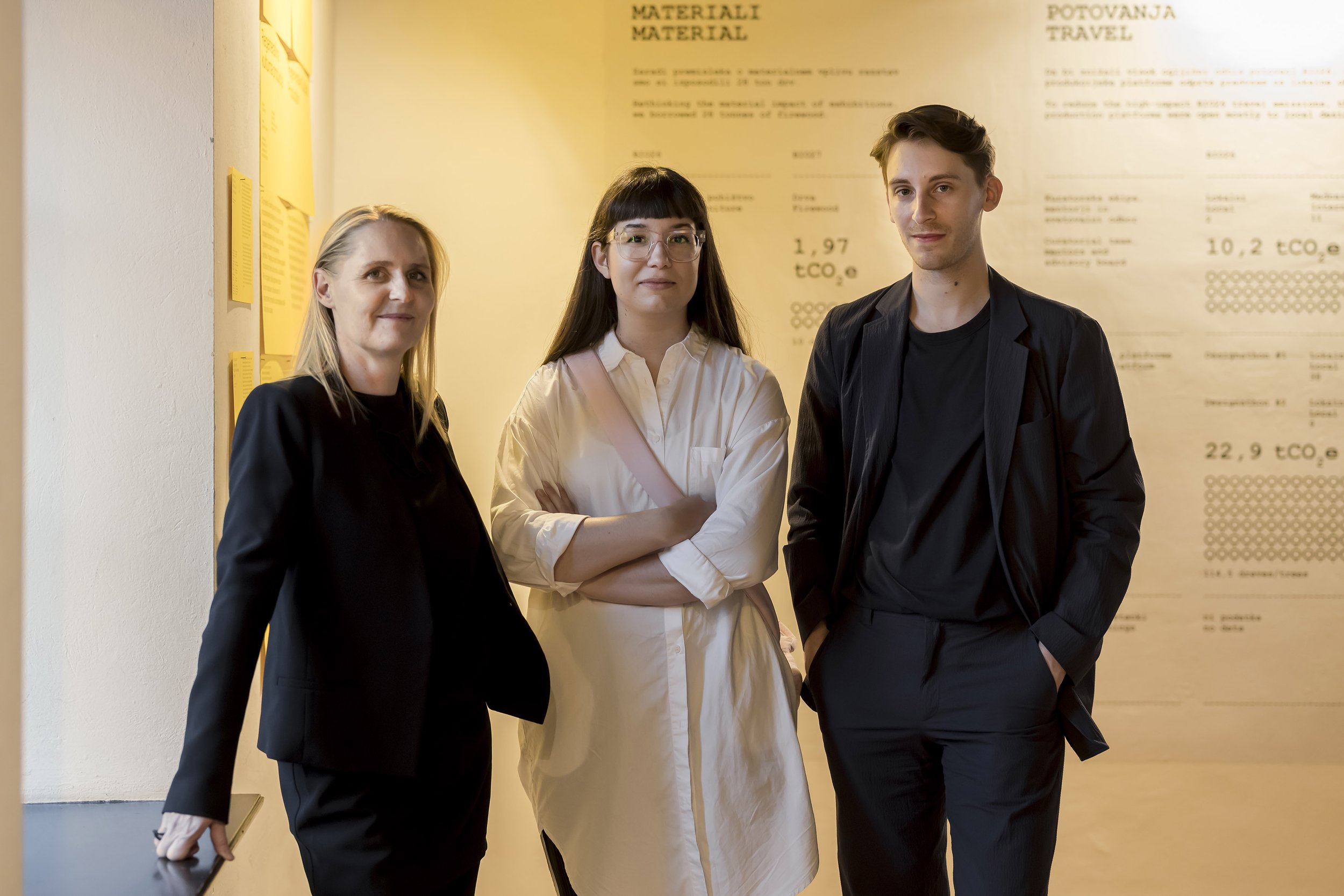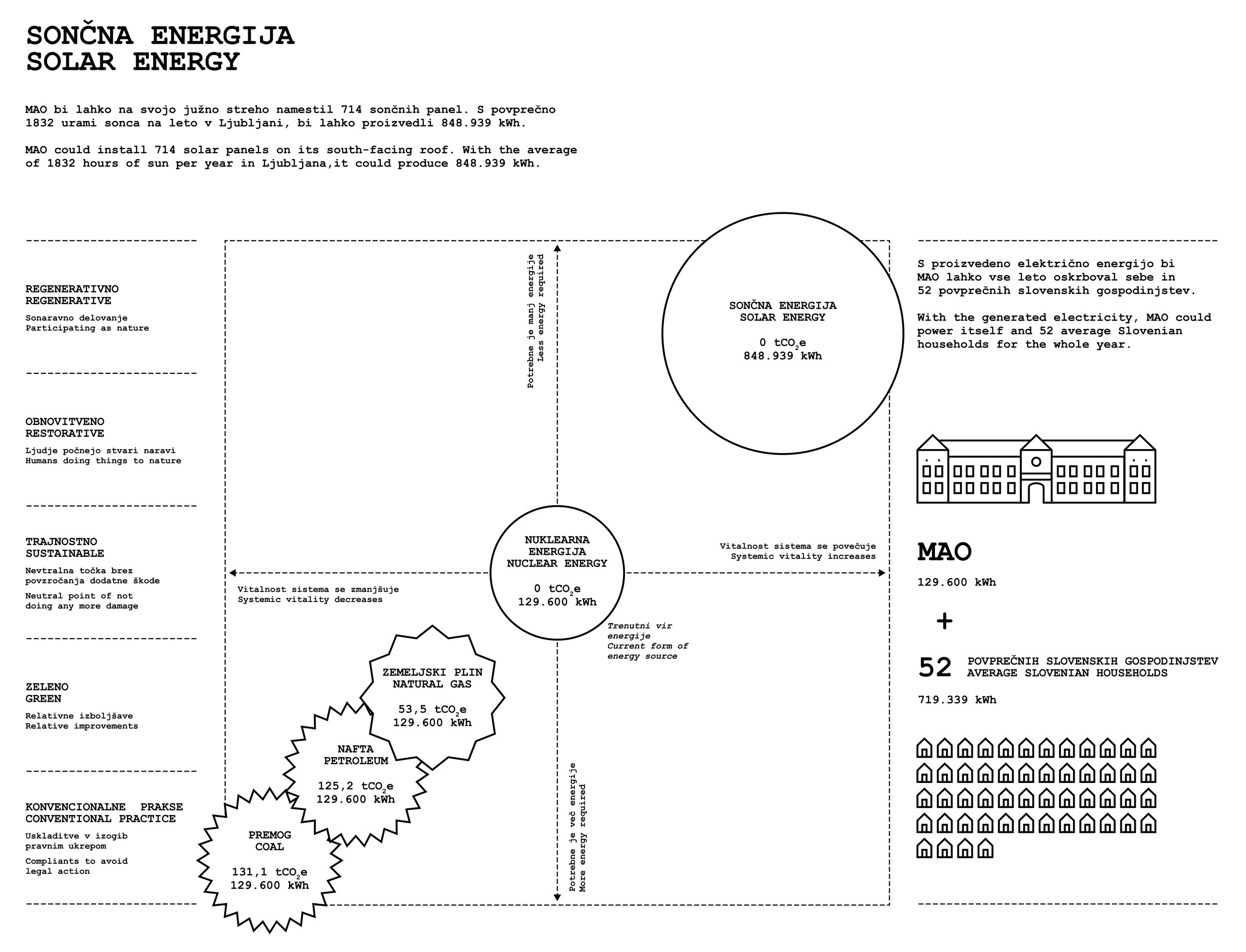Futuring, as a co-project for BIO27, is the field of using a systematic process for thinking about and planning for the future; picturing possible outcomes. Or as Tony Fry explained, »Design Futuring argues that responding to ethical, political, social and ecological concerns requires a new type of practice which recognises design's importance in overcoming a world made unsustainable.« We are Futuring.
Futuring's objective is to use the biennial to interrogate its practices and future; to observe, source, and examine the existing sustainable practices in cultural production. Our findings are collected in an open-source toolkit. Moreover, we offer selected perspectives on sustainability (via audio guide, AR visualisations and infographics). The findings will enable cultural institutions, designers (and individuals) to reduce the environmental impact of their work.
Futuring, mentored by designer and sustainability expert Sophie Thomas, is undertaking an environmental audit of the Super Vernaculars biennial and is guiding the reduction of its environmental impact.
In 2015, the Sustainable Development Goals and the Paris Agreement (a legally binding international treaty on climate change) were adopted. The nature of this global challenge requires a collective response across all sectors and scales. It is essential that, aside from talking about environmental impact, every organisation (and individual) analyses its own actions and commits to being environmentally responsible.
Museums play a dual and indispensable role in society. They safeguard our future generations’ engagement in cultural heritage. At the same time, they are actors themselves, places that contribute to a socially, ecologically, and culturally conscious society by incorporating the future of our life worlds.
Futuring is the field of using a systematic process for thinking about and planning for the future; for picturing possible outcomes. As Tony Fry explained, “Design Futuring argues that responding to ethical, political, social and ecological concerns requires a new type of practice which recognises design's importance in overcoming a world made unsustainable.”
The challenging task of finding a new type of practice was undertaken by three avid researchers: Žan Kobal, Tamara Lašič Jurković, and Barbara Predan. Žan approaches design as an investigative medium. His work often crosses the traditional boundaries of design. By delving into film and installation, he frames objects as narrative devices, revealing how material, craft, and discourse co-create reality. In her work, Tamara focuses on environmental and social problems of the 21st century, and the role of design. She seeks solutions in product, service, systemic, and speculative design. The emphasis is on co-creation, participation, and accessibility for the empowerment of individuals and communities. Barbara is an incurable idealist who believes that one’s agency holds the potential to change society for the better. As a result, she critically examines existing design practices.
Or, to put it simply, We Are Futuring.
Our work can be seen in the Museum of Architecture and Design MAO until September 29.
The 27th edition of BIO Ljubljana (BIO27), The Museum of Architecture and Design (MAO)
Photo: Aleš Rosa
Futuring 1
Sustainable Cultural Production: Museum
Futuring - Žan Kobal, Tamara Lašič Jurković, Barbara Predan, Sophie Thomas
This is an open-source toolkit. It enables cultural institutions and designers to reduce the impact of their work. The recommendations are designed to help end-users make informed decisions on whether, when, and how to undertake specific actions – such as how to reduce carbon emissions, organise administrative operations efficiency, build the community with outreach and education, and ensure sustainable exhibition production. The guide stands on the shoulders of many and is open source. We encourage all to embody its knowledge. Your feedback – or, better yet, content contribution – is very welcome.
Collaborators: Milan Dinevski, Graciela Melitsko Thornton (Julie’s Bicycle), Zana Oručević Mehulj, Anja Radović, Maša Špiler, Maja Šuštaršič
Reviewers: Jane Withers, Ria Hawthorn
Community knowledge: Production Platform Teams BIO27, MAO staff
Slovene translation: Nataša Velikonja
Copy-editing by: Soglasnik Language Cooperative
Design: Studio Kruh and AA
Printed by: Birografika Bori
Produced and published by: Pekinpah, MAO, Center for Creativity, BIO27
Futuring 2
Perspectives on Sustainability: Infographics
Futuring - Žan Kobal, Tamara Lašič Jurković, Barbara Predan
In addition to the outstanding educational and social role of museums, the implications of each exhibition production should not be overlooked. For this reason, we have put sustainable production (and beyond) at the core of BIO27 and future editions of the biennial. We are making considerable changes to the way we work and leading by example to reduce environmental impact. The infographic focuses on the potential of regenerative design, which is often overlooked by public institutions. We have put the spotlight on energy, water, travel/transport, and exhibition design. Some of the data presented here is visualised with the amount of trees that would have to be planted and grown for 10 years to offset the emissions.
Collaborators: Ria Hawthorn, Milan Dinevski, Anja Radović, Maja Šuštaršič, Jane Withers
Design: Studio Kruh and AA
Produced by: Pekinpah, MAO, BIO27
Futuring 3
Perspectives on Sustainability: Augmented Reality
Futuring - Žan Kobal, Tamara Lašič Jurković, Barbara Predan
Digital transformation is enabling improved conservation and study of artworks, while virtual museums and exhibitions are able to disseminate their images globally, thus democratising art and design. If you are interested in how much energy the museum could generate with solar panels and how much water it could collect annually with rainwater, scan on the marker and capture the information using augmented reality.
Collaborators: Ria Hawthorn, Maja Šuštaršič, Jane Withers
AR developer: Žiga Pavlovič
Produced by: Pekinpah, MAO, BIO27
Futuring 4
Perspectives on Sustainability: Live Infographics
Futuring - Žan Kobal, Tamara Lašič Jurković, Barbara Predan
Urban road transport is an important source of pollution and carbon emissions (see chart). Outdoor air pollution has been identified by WHO as the world’s “largest single environmental health risk”, accounting for an estimated 4.2 million deaths per year. In line with sustainable development goals, MAO would like to gain insight into the mobility of museum visitors. Hence, we are asking for your help. Write the place you came from on a yellow sticker, then stick it next to the pictogram corresponding to the means of transport you used to get to the museum. After the conclusion of BIO27, MAO will make calculations and design low-carbon travel guidelines based on the received insights.
Collaborators: Ria Hawthorn, Anja Radović, Jane Withers
Design: Studio Kruh and AA
Produced by: Pekinpah, MAO, BIO27
Futuring 5
Perspectives on Sustainability: Audio Guide
Futuring - Žan Kobal, Tamara Lašič Jurković, Barbara Predan
Through active public participation, museums can engage with diverse communities and share knowledge in ways that transform lives. It is therefore of vital importance for museums to focus on diversity and distribution, and find ways to inspire others to take collective action. The selected stories from the audio guide aim to do just that: to shed light on the stories behind the scenes and the process of the Biennale's production. Moreover, the stories show the often-overlooked opportunities and the extreme importance of the choices we make along the way. These seven diverse perspectives on sustainability illustrate the importance of every single detail.
Collaborators: Ria Hawthorn, Anja Radović, Jana Stardelova, Maja Šuštaršič, Nuša Zupanc, Jane Withers
Slovene translation: Nataša Velikonja
English speaker: Flora Lisica
Slovene speaker: Branko Jordan
Produced by: Pekinpah, MAO, BIO27
RESEARCH GROUP FUTURING
Group members: Žan Kobal, Tamara Lašič Jurković, Barbara Predan
Mentor: Sophie Thomas
Topic: Sustainable Production
RESEARCHERS
Žan Kobal is a Slovene designer, researcher, and writer. After graduating in Industrial Design (cum laude) at the University of Ljubljana Academy of Fine Arts and Design (SI), he continued his studies at Design Academy Eindhoven (NL) obtaining a Master’s degree (cum laude) in Contextual Design. Approaching design as an investigative medium, his work often crosses the traditional boundaries of design by delving into film and installation to frame objects as narration devices, unfolding how material, craft and discourse co-create reality.
Tamara Lašič Jurković obtained her master’s degree in industrial design in 2020 from the University in Ljubljana Academy of Fine Arts and Design. In her work, she focuses on environmental and social problems of the 21st century and the role of design in their consideration. She seeks solutions in product, service, systemic and speculative design with an emphasis on co-creation, participation, open source and accessibility for the empowerment of individuals and communities. As a co-curator, she participated in the conception of the exhibition Thinking the Conditions of Our Time, which was presented in 2019 at the XXII Triennale di Milano — 2019 Broken Nature. Since 2020, she has been collaborating with the design studio Ljudje, where she co-creates socially responsible campaigns, creative workshops and exhibitions.
Barbara Predan is an assistant professor, theoretician, lecturer, and author. She is also a co-founder and leader of the department of design theory at the Pekinpah Association, and the director of the Institute of Design. She has published several professional and scholarly articles and is the author or co-author of six books, has edited ten books and curated twenty exhibitions. Since 2009 she teaches at the University of Ljubljana Academy of Fine Arts and Design and regularly lectures at international academic and professional conferences.
PRODUCER
Pekinpah Association
Hosting the Institute of Design, home to the Silence band, and representing radical dance artists, the Pekinpah association brings together internationally acclaimed designers, theorists, architects, choreographers, dancers and musicians. Established in 2007, the Ljubljana-based Pekinpah has facilitated artistic, cultural and scientific creation, developed theoretical discourse, as well as organised numerous events and research and education activities. Pekinpah has always aimed at deepening and upgrading these areas of cultural production, while strengthening the theoretical discourse within Pekinpah's spheres of interest.




